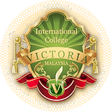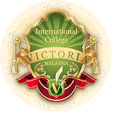Certificate in Hotel and Catering Management
| Course Title | Certificate in Hotel and Catering Management (A9485) | ||||||||||||||
| Course Overview | The hotel industry is one the world’s fastest growing sectors. This course is modelled to produce professionals for the international food and beverage industry. Graduates are equipped with all the necessary skills and knowledge required by the industry. Hotel catering management at Victoria International College gives equal importance to practical skills and theoretical knowledge. |
||||||||||||||
| Study Mode | Full time – One year | ||||||||||||||
| Commencement | January, April, May August (flexible intakes available on demand) | ||||||||||||||
| Entry Requirements | SPM / UEC with three credits STPM Diploma / Pre-University or equivalent qualification |
||||||||||||||
| Course Details |
|
Hotel Catering Management
The hotel industry is one the world’s fastest growing sectors. This course is modeled to produce professionals for the international food and beverage industry. Graduates are equipped with all the necessary skills and knowledge required by the industry. Hotel catering management at Victoria International College gives equal importance to practical skills and theoretical knowledge.
Hotels are establishments that provide paid accommodation and other services to guests. Originating as Inns, hotels have come a long way and developed into a specialized business sector. Other than basic accommodation facilities, hotel rooms may come with additional facilities like an en-suite bathroom, telephone, television, minibar, air conditioning, side table and so on. Hotel management is an elaborate process. Large hotels are generally headed by a general manager who is subordinated by department heads, and operational and administrative staff.
The income generated from the rooms is the primary source of revenue in hotels. The next main source is food and beverage. The outlets attract the in house guests as well as non-resident guests. Food in hotels is produced on a large scale and requires a lot of planning and organization. Catering management is growing in popularity as a career option. Hotels require professionals who are educated and trained in managing the kitchen operations of their properties.
Hotel catering is not restricted to the food and beverage outlets within the establishment. Many hotels take orders for outdoor catering services like weddings, parties, seminars, concerts and other such events. This can be quite challenging as the food is prepared and served at different locations. Quality control and wastage is the top priority for outdoor catering. Hotel catering also includes room service, banquet events and special events that may run alongside everyday operations.
This course aims at training you in all the subjects necessary for managing hotel catering. The students will gain hands-on experience in food and beverage production and presentation. With state-of –the-art facilities to train the students, you will graduate with all the skills desired by the best hotels.
About the Course
The Hotel Catering course offered by Victoria International College (VIC) is designed to ensure you meet the needs of the industry. Along with theoretical training, this course provides practical training. Industry experience is an essential part of the course and helps students gain a better knowledge of the current trends in the industry. Exams, industry appraisals and reviews are structured to ensure the most competent learning environment. Some of the subjects offered in this course are discussed below.
- Food and Beverage Production
- Bakery and Confectionary
- Nutrition
- Accountancy
- Foundation in Tourism
- Computers
- Economics
- Food and Beverage Management
- Food and Beverage Service
- Hotel engineering
- Waste Management
- Hygiene and Hotel Law
- Human Resource Management
Food and Beverage Production: Food and beverage production is a core subject in this course. It includes everything to do with food preparation according to hotel standards, right from the basics to international cuisines. Beverages are concentrated primarily at the bar. However, this subject teaches the art of mixing and concocting beverages. Food presentation techniques are also taught in this segment. The focus in this subject is mainly the hot kitchen. Apart from the theory, the practical food and beverage lab is where most learning takes place.
Bakery and Confectionary: Bakery and confectionary teaches the students all about breads, cakes and pastries. Breads and cookies lay the foundation in this subject, which then progresses to more complicated preparations. It also includes the preparation of some beverages like milkshakes and fresh fruit juices. Pastry decoration and presentation is an important segment of this subject. Practical classes complement the theoretical sessions.
Nutrition: Nutrition teaches students the science behind food. This is helpful in handling special requests like guests with allergies and health food or special diet requirements. It explains the different food groups and the importance of a healthy diet. It gives the students valuable insight on what goes into their cooking. It also discusses the methods of cooking and their effects on ingredients.
Accountancy: The purchases made in a hotel kitchen need to be budgeted for. This subject teaches students how to maintain accounts that help in managing inventory and purchases. The basics of accounts are first taught, followed up by all the types of accounting. This is essential in planning and forecasting budgets and purchase trends in a hotel.
Foundation in Tourism: This subject teaches the students basics of tourism. As hotels cater to an international clientele, it is important for professionals in the field to be aware of cultural preferences and tendencies. Foundation in tourism highlights the characteristics traits of tourists and their behavior while on holiday. It helps students get a better understanding of what guests expect from the hotel.
Computers: Knowledge of computers is essential as most data is recorded and communicated through computers. This subject teaches the basics of using a computer and how certain programs function. Basics like Microsoft office and internet services are taught. It concentrates on hotel management software that has divisions for managing culinary operations.
Economics: Economics educate the students on the basics of the financial aspects of the catering business. It teaches basic theories that help students understand the functioning of a market. This is essential while planning operations in a hotel. Economics also makes students understand the global market and competition. A basic knowledge of it is important in order to grasp the importance of establishing a market.
Food and Beverage Management: Food and beverage management involves planning, controlling and overseeing food and beverage operations. Good organization and management in the kitchen is vital to ensure smooth functioning. This subject teaches students to delegate work, handle shifts and manage the entire operations of a kitchen. It is an essential subject for those aiming to head their own kitchen.
Food and Beverage Service: Once the food leaves the kitchen, the service staff delivers it to the guest. Excellent coordination between the chefs and service staff is essential to an outlet. Good communication between the two departments will make sure the right food is delivered to the right table. It is important to practice good hygiene while the food is waiting to be picked up and while it is being served to the guest. Types and procedures of service are taught in this module.
Hotel Engineering: Hotel engineering teaches the students the functioning of the machines and systems in the hotel. The kitchen is equipped with a lot of heavy duty machinery that needs to be maintained in order to function properly. If not handled carefully it can be hazardous to the people in the kitchen. This subject teaches students the basics engineering functions to prevent accidents.
Wastage and Waste Management: There is a lot of wastage in terms of excess food prepared, returned orders, spoilage and pilferage. Wastage educates the students on techniques to minimize this amount as it can prove costly in the long run. The kitchens also have a lot of degradable garbage that should be handled and disposed of correctly. Waste segregation is one of the main considerations during managing garbage. Improper handling of waste can lead to contamination and the spread of diseases. There are usually specific laws regarding waste management.
Hygiene and Hotel Law: Every state has laws regarding the operations of a hotel. The policies surrounding hygiene are usually very strict. In order to adhere to these laws it is important to be educated on their purpose and existence. Poor sanitary conditions, especially in food production and handling areas can cause serious illnesses. The students are educated on how to maintain proper hygiene, personal and of their work place. Regular checks and inspections ensure the laws are being maintained. This subject includes details on inspection procedures.
Human Resource Management: Hiring the right staff is the key to smooth operations. Each staff member contributes some part to the overall product. But human resources does not stop here, managing the staff is equally important. This subject teaches students the fundamentals of human resources. It helps students in procedures related to staffing, training and development, and duty allocation.
Why choose this course?
The hotel industry is an essential part of tourism. With the growth in tourism, hotels have seen rapid expansion as well. The standards of hotels are rising and trained professionals are in great demand. VIC offers high quality education and practical experience. The course content is kept up to date with current trends in the industry.
The teaching faculties are all experienced in the industry and provide relevant inputs with regards to their subjects. The limited class size ensures every student gets individual attention and is academically challenged at the same time. This course also includes industry experience, which prepares the students for careers in the field. VICs tie ups with industry professionals and foreign universities, provides students with unlimited opportunities post-graduation.
The college also focuses on extracurricular activities related to the field. Food fairs, competitions, debates and other events are organized. These events give the students the opportunity to apply their skills in different ways. The staff members encourage their students to innovate and develop their leadership qualities. The university offers a multicultural environment for its students. It boasts of a large international student community which offers support to new students. The methods employed to teach are diverse and engage the students. Exams, debates, competitions, presentations, field trips, industry visits are some such activities.
Career Prospects for Students
The degree in Hotel Catering Management opens up a lot of avenues for graduates. The training provided by VIC incorporates traits in the students, which makes them excel in the industry. Graduates from this program can work in hotels, hospitals, restaurants and various other catering establishments. The knowledge gained over the period of the course will enable students to take up careers in non-food producing sectors as well. These include consulting, management, food writers, and researchers to name a few. The career options on completion of this course are:
- Chef
- Food production manager
- Food consultant
- Food journalist
- Outlet manager
- Food and Beverage writer
- Food critic
- Food Stylist
- Baker
- Entrepreneur
- Food and Beverage Director
The practical experience that this course provides sets it apart from others of its kind. Internships and industrial training helps the students get a feel of what the industry is actually like. During their training students gets the opportunity to work in all departments of the hotel. This promotes better understanding of the interrelatedness of the different sectors. VIC helps make students transition from the classroom to the industry smooth. A large number of students trained in hotel catering management are venturing out and starting their own businesses. Food always has a market; this course enables students to excel in it.

SIGN UP NOW FOR
+60149370985
+60166822047
SILA ISIKAN BORANG PERMOHONAN

SIGN UP NOW FOR
+60149370985
+60166822047
Please fill the Scholarship form


 Malay
Malay English
English
